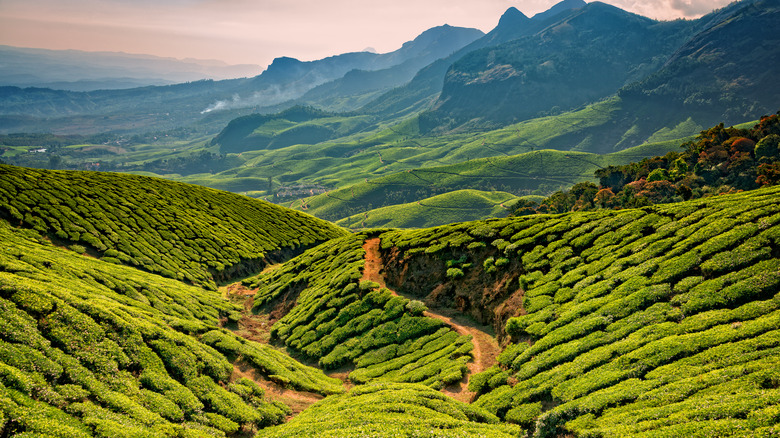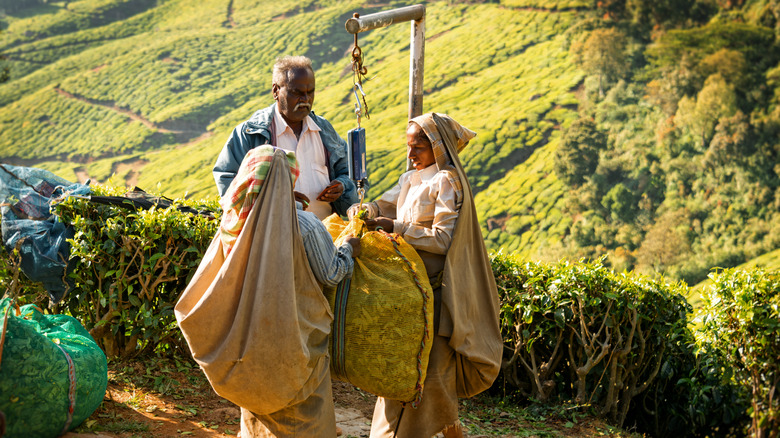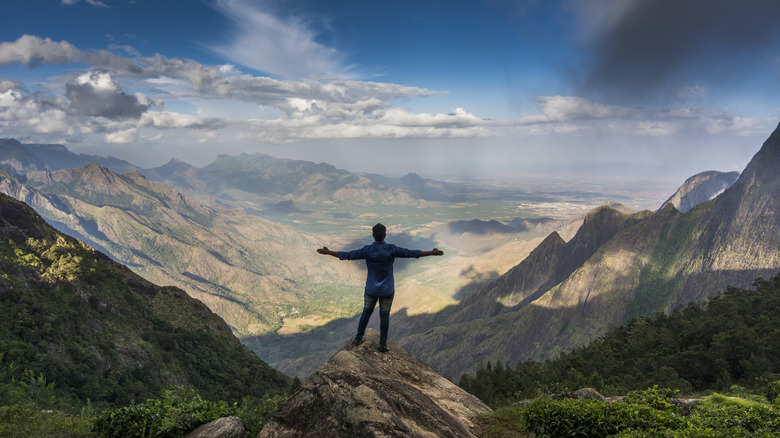The World's Highest Tea Estate Is An Indian Mountain Gem With Breathtaking Views & Tours
Just how high is 7,900 feet? It's higher than any peak east of the Mississippi. It's well over 2,000 feet higher than Denver, Colorado, the "mile-high city." Low-lying clouds hover at around 6,200 feet, so you can often look down on stratus sheets. Just a little higher (8,000 feet) humans are vulnerable to altitude sickness. A small, unpressurized airplane may treat 7,900 feet as a comfortable cruising altitude.
That's the elevation of the Kolukkumalai, a small municipality in the Western Ghats mountain range of India. The landscape is epic and stunning, and these mountains defy expectations; they stand in the southern state of Tamil Nadu, hundreds of miles from the better-known Himalayas. This unique climate is ideal for growing tea, and Kalukkumalai holds the record for the highest tea estate in the world. Vibrant green-leafed plants grow in rows and bunches, forming mesmerizing patterns over the rolling hillsides. Far from the megacities and sultry lowlands that Tamil Nadu is known for, Kolukkumalai is a refreshing alpine getaway, where even the hottest days rarely break 80 degrees Fahrenheit.
British colonists founded the plantation in the 1920s, and Kalukkumalai has produced distinctive tea profiles for the past century. Like many fertile agricultural regions around the world, Kalukkumalai now lures tourists with a wide range of activities, and tea lovers travel from all over to hike these hills and taste freshly-steeped pekoe. More and more travelers are learning about India's incredible mountain ranges that boast otherworldly beauty, and Kalukkamalai is a fantastic excuse to explore the Western Ghats.
What to do in Kalukkumalai
Many visitors will come to Kalukkumalai for the tea itself. You can roam the plantation, watch cultivators at work, and see how leaves are harvested and processed. You can taste these high quality varieties to your taste buds' content, and you'll probably walk away with gift boxes for those back home. Make sure your tea is stored inside a sealed package to avoid hassles at airports or international borders.
Yet Kalukkumalai offers far more than steaming beverages, and adventurers of all stripes will find something to love here. Getting to Kalukkumalai usually requires a breakneck jeep-ride along rugged switchbacks; this region gets a lot of rain, and the roads are narrow and largely unpaved. When you arrive, you can pick from dozens of luxury hotels and resorts, or join an organized tour that provides rustic tents. Low-key outdoor enthusiasts can enjoy walks, prepared meals, and bonfires, among other bucolic activities.
More action-packed excursions include the Jeep Safari, which carries tourists deep into the hills, and hiking treks along paths; both can be timed around spectacular sunrises and sunsets. Between the thinner air and steep terrain, visitors should be in decent physical shape before embarking on the harder routes. These tours often include guides, meals, and tea tastings. A growing number of visitors sign up for yoga and wellness retreats, which take advantage of the isolation and gorgeous vistas. If this is your first time in this part of the world, here's how to be a respectful tourist while visiting India.
Getting to Kolukkumalai
You will have to earn this particular paradise: The closest major airport is Cochin International, just outside the city of Kochi on the southwest coast. A direct drive from the airport to Kolukkumalai takes more than four hours, at minimum. If you're taking a bus, head to the town of Suryanelli and plan to hire a jeep for the final 40-minute drive. Weather will have a significant impact on road conditions, especially on the final leg up the mountain. While India's railroad network is among the most comprehensive in the world, the nearest station is even farther than the Kochi airport.
While few Americans or Europeans have heard of the Western Ghats, this mountain range forms a spine along India's western coast and stretches nearly 1,000 miles. These highlands are famous for their biodiversity, including 300 threatened animal species and one-third of Asia's entire elephant population. Amateur botanists can admire 5,000 kinds of flowering plants as well.
If you're looking for tea, Tamil Nadu and its neighboring states, Karnataka and Kerala, are the most productive tea-growing regions in the country, and they're all nestled in the south. The culinary traditions of Tamil Nadu tend toward the spicy and tangy, pairing well with a rich cup of black tea. If you've never eaten a meal here before, here's what tourists need to know about India's unique dining etiquette.


